BULAW5914 Business Law: Tort Law & Consumer Rights Case Analysis
VerifiedAdded on 2023/06/07
|14
|3110
|164
Case Study
AI Summary
This assignment is a case study analyzing legal issues related to tort law and Australian consumer law. It examines a scenario where a consumer, Ann, suffers illness due to a defective product (salami) and explores her rights against both the manufacturer (Smallgoods Pty. Ltd.) and the supermarket (Supermarkets Pty. Ltd.). The analysis covers negligence, duty of care, contributory negligence, and relevant sections of the Australian Consumer Law, including consumer guarantees and manufacturer liability. The assignment also addresses the concept of vicarious liability in the context of an employee seeking to sue their employer for negligence. The solution provides a detailed legal reasoning and conclusion for each issue, determining the extent of liability and potential remedies available to the affected parties. Desklib provides access to similar solved assignments and past papers for students.

Running ead S SS A D C R RA AH : BU INE N O PO TION L W 0
Paraphrase This Document
Need a fresh take? Get an instant paraphrase of this document with our AI Paraphraser
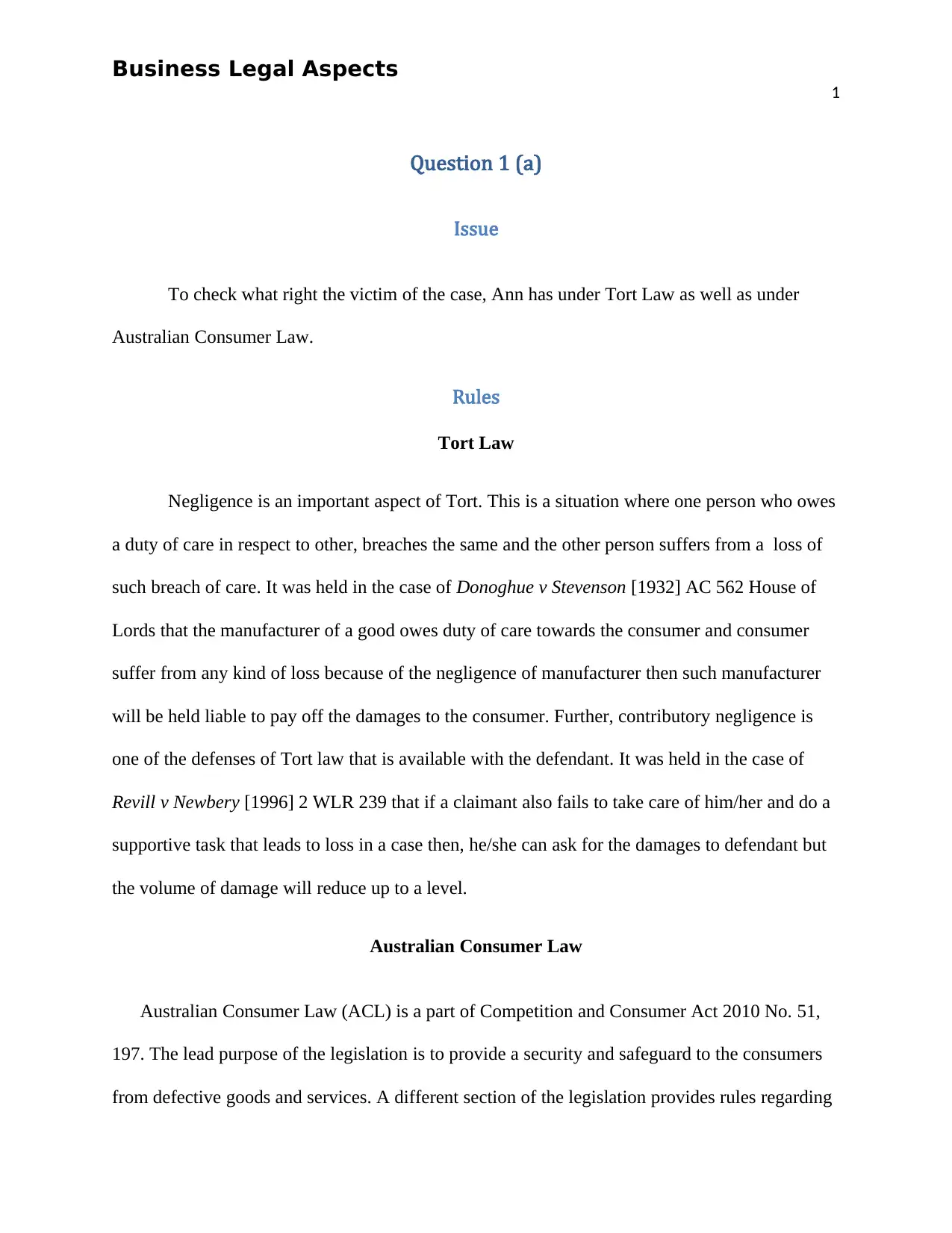
Business Legal Aspects 1
Question 1 (a)
Issue
To check what right the victim of the case, Ann has under Tort Law as well as under
Australian Consumer Law.
Rules
Tort Law
Negligence is an important aspect of Tort. This is a situation where one person who owes
a duty of care in respect to other, breaches the same and the other person suffers from a loss of
such breach of care. It was held in the case of Donoghue v Stevenson [1932] AC 562 House of
Lords that the manufacturer of a good owes duty of care towards the consumer and consumer
suffer from any kind of loss because of the negligence of manufacturer then such manufacturer
will be held liable to pay off the damages to the consumer. Further, contributory negligence is
one of the defenses of Tort law that is available with the defendant. It was held in the case of
Revill v Newbery [1996] 2 WLR 239 that if a claimant also fails to take care of him/her and do a
supportive task that leads to loss in a case then, he/she can ask for the damages to defendant but
the volume of damage will reduce up to a level.
Australian Consumer Law
Australian Consumer Law (ACL) is a part of Competition and Consumer Act 2010 No. 51,
197. The lead purpose of the legislation is to provide a security and safeguard to the consumers
from defective goods and services. A different section of the legislation provides rules regarding
Question 1 (a)
Issue
To check what right the victim of the case, Ann has under Tort Law as well as under
Australian Consumer Law.
Rules
Tort Law
Negligence is an important aspect of Tort. This is a situation where one person who owes
a duty of care in respect to other, breaches the same and the other person suffers from a loss of
such breach of care. It was held in the case of Donoghue v Stevenson [1932] AC 562 House of
Lords that the manufacturer of a good owes duty of care towards the consumer and consumer
suffer from any kind of loss because of the negligence of manufacturer then such manufacturer
will be held liable to pay off the damages to the consumer. Further, contributory negligence is
one of the defenses of Tort law that is available with the defendant. It was held in the case of
Revill v Newbery [1996] 2 WLR 239 that if a claimant also fails to take care of him/her and do a
supportive task that leads to loss in a case then, he/she can ask for the damages to defendant but
the volume of damage will reduce up to a level.
Australian Consumer Law
Australian Consumer Law (ACL) is a part of Competition and Consumer Act 2010 No. 51,
197. The lead purpose of the legislation is to provide a security and safeguard to the consumers
from defective goods and services. A different section of the legislation provides rules regarding
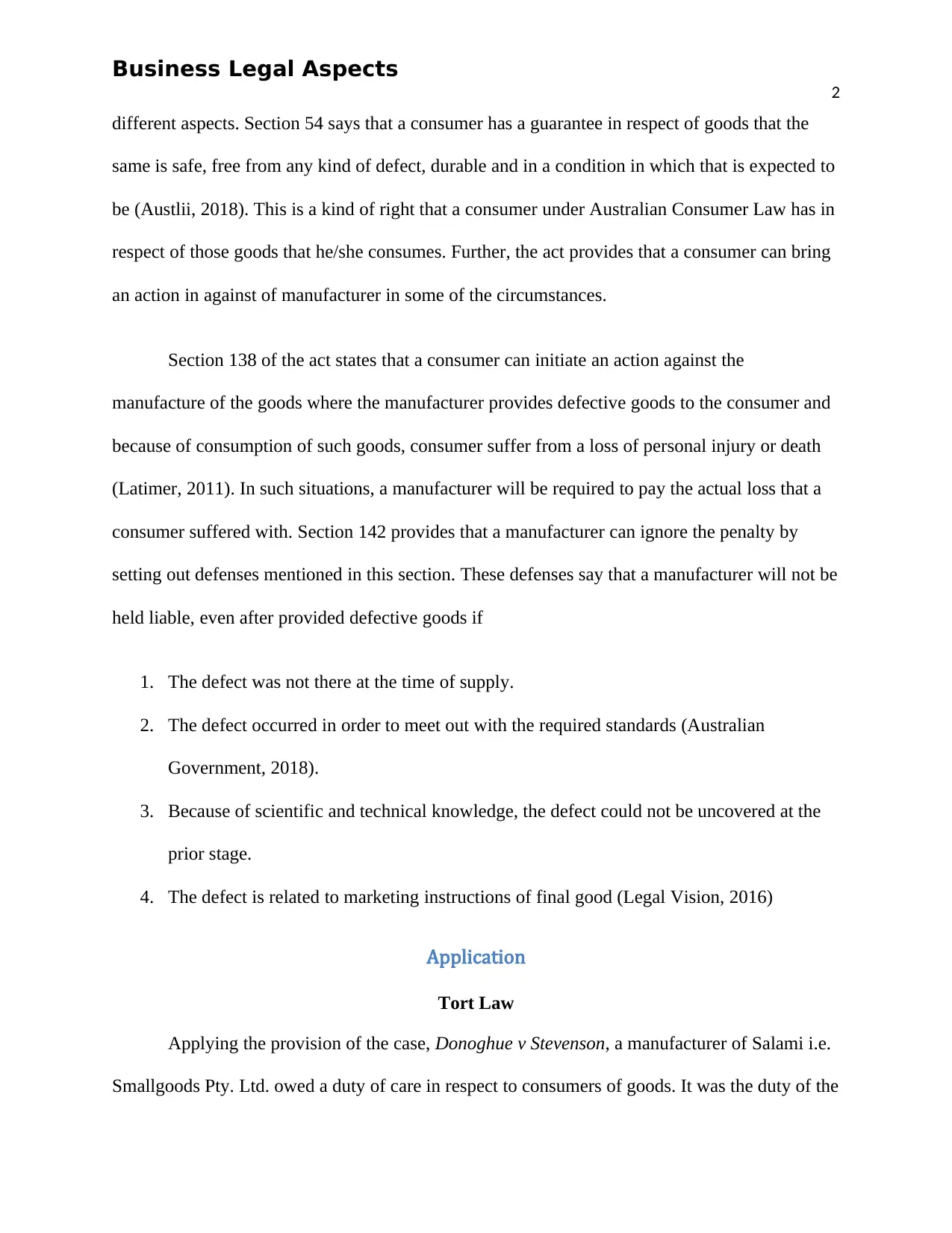
Business Legal Aspects 2
different aspects. Section 54 says that a consumer has a guarantee in respect of goods that the
same is safe, free from any kind of defect, durable and in a condition in which that is expected to
be (Austlii, 2018). This is a kind of right that a consumer under Australian Consumer Law has in
respect of those goods that he/she consumes. Further, the act provides that a consumer can bring
an action in against of manufacturer in some of the circumstances.
Section 138 of the act states that a consumer can initiate an action against the
manufacture of the goods where the manufacturer provides defective goods to the consumer and
because of consumption of such goods, consumer suffer from a loss of personal injury or death
(Latimer, 2011). In such situations, a manufacturer will be required to pay the actual loss that a
consumer suffered with. Section 142 provides that a manufacturer can ignore the penalty by
setting out defenses mentioned in this section. These defenses say that a manufacturer will not be
held liable, even after provided defective goods if
1. The defect was not there at the time of supply.
2. The defect occurred in order to meet out with the required standards (Australian
Government, 2018).
3. Because of scientific and technical knowledge, the defect could not be uncovered at the
prior stage.
4. The defect is related to marketing instructions of final good (Legal Vision, 2016)
Application
Tort Law
Applying the provision of the case, Donoghue v Stevenson, a manufacturer of Salami i.e.
Smallgoods Pty. Ltd. owed a duty of care in respect to consumers of goods. It was the duty of the
different aspects. Section 54 says that a consumer has a guarantee in respect of goods that the
same is safe, free from any kind of defect, durable and in a condition in which that is expected to
be (Austlii, 2018). This is a kind of right that a consumer under Australian Consumer Law has in
respect of those goods that he/she consumes. Further, the act provides that a consumer can bring
an action in against of manufacturer in some of the circumstances.
Section 138 of the act states that a consumer can initiate an action against the
manufacture of the goods where the manufacturer provides defective goods to the consumer and
because of consumption of such goods, consumer suffer from a loss of personal injury or death
(Latimer, 2011). In such situations, a manufacturer will be required to pay the actual loss that a
consumer suffered with. Section 142 provides that a manufacturer can ignore the penalty by
setting out defenses mentioned in this section. These defenses say that a manufacturer will not be
held liable, even after provided defective goods if
1. The defect was not there at the time of supply.
2. The defect occurred in order to meet out with the required standards (Australian
Government, 2018).
3. Because of scientific and technical knowledge, the defect could not be uncovered at the
prior stage.
4. The defect is related to marketing instructions of final good (Legal Vision, 2016)
Application
Tort Law
Applying the provision of the case, Donoghue v Stevenson, a manufacturer of Salami i.e.
Smallgoods Pty. Ltd. owed a duty of care in respect to consumers of goods. It was the duty of the
⊘ This is a preview!⊘
Do you want full access?
Subscribe today to unlock all pages.

Trusted by 1+ million students worldwide
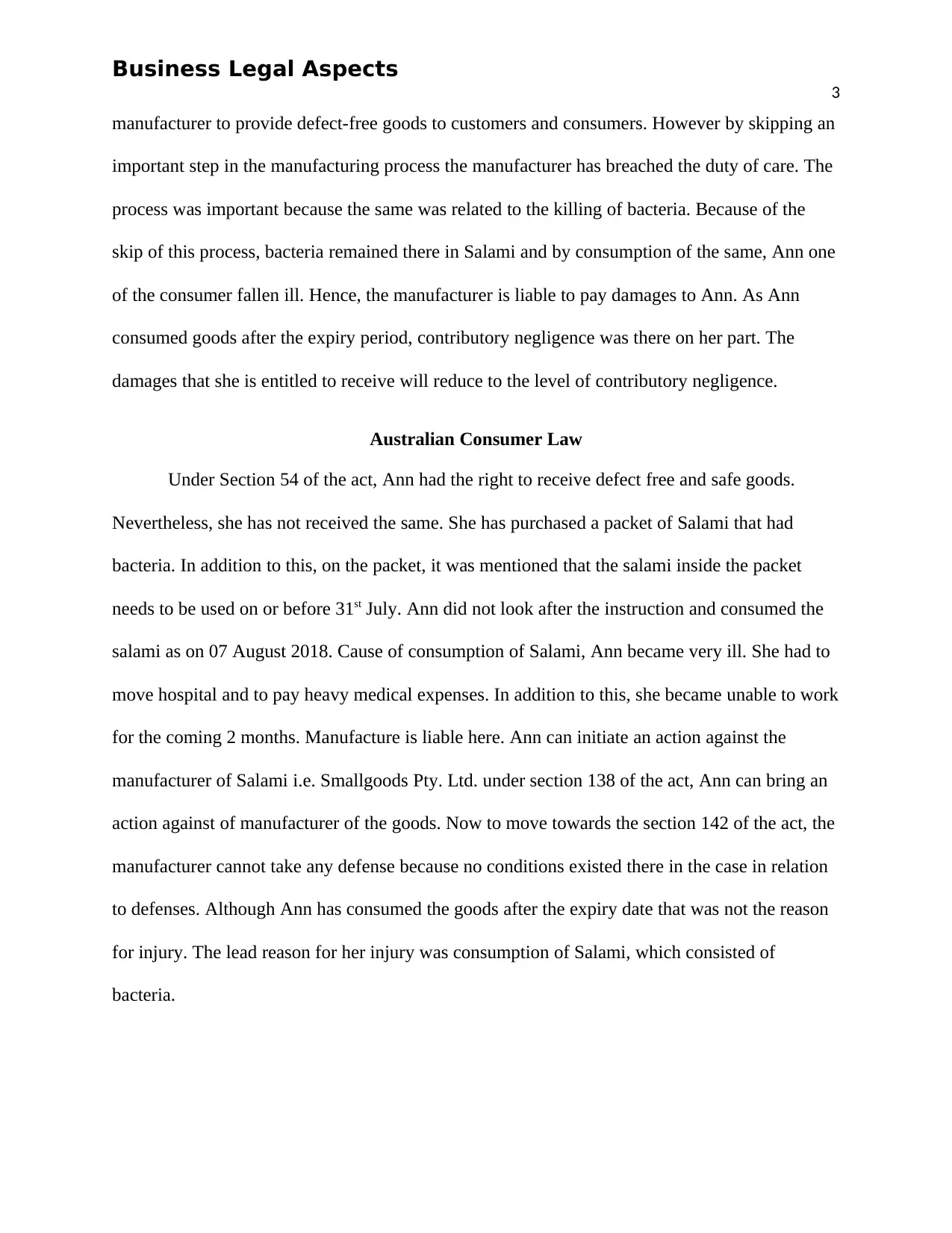
Business Legal Aspects 3
manufacturer to provide defect-free goods to customers and consumers. However by skipping an
important step in the manufacturing process the manufacturer has breached the duty of care. The
process was important because the same was related to the killing of bacteria. Because of the
skip of this process, bacteria remained there in Salami and by consumption of the same, Ann one
of the consumer fallen ill. Hence, the manufacturer is liable to pay damages to Ann. As Ann
consumed goods after the expiry period, contributory negligence was there on her part. The
damages that she is entitled to receive will reduce to the level of contributory negligence.
Australian Consumer Law
Under Section 54 of the act, Ann had the right to receive defect free and safe goods.
Nevertheless, she has not received the same. She has purchased a packet of Salami that had
bacteria. In addition to this, on the packet, it was mentioned that the salami inside the packet
needs to be used on or before 31st July. Ann did not look after the instruction and consumed the
salami as on 07 August 2018. Cause of consumption of Salami, Ann became very ill. She had to
move hospital and to pay heavy medical expenses. In addition to this, she became unable to work
for the coming 2 months. Manufacture is liable here. Ann can initiate an action against the
manufacturer of Salami i.e. Smallgoods Pty. Ltd. under section 138 of the act, Ann can bring an
action against of manufacturer of the goods. Now to move towards the section 142 of the act, the
manufacturer cannot take any defense because no conditions existed there in the case in relation
to defenses. Although Ann has consumed the goods after the expiry date that was not the reason
for injury. The lead reason for her injury was consumption of Salami, which consisted of
bacteria.
manufacturer to provide defect-free goods to customers and consumers. However by skipping an
important step in the manufacturing process the manufacturer has breached the duty of care. The
process was important because the same was related to the killing of bacteria. Because of the
skip of this process, bacteria remained there in Salami and by consumption of the same, Ann one
of the consumer fallen ill. Hence, the manufacturer is liable to pay damages to Ann. As Ann
consumed goods after the expiry period, contributory negligence was there on her part. The
damages that she is entitled to receive will reduce to the level of contributory negligence.
Australian Consumer Law
Under Section 54 of the act, Ann had the right to receive defect free and safe goods.
Nevertheless, she has not received the same. She has purchased a packet of Salami that had
bacteria. In addition to this, on the packet, it was mentioned that the salami inside the packet
needs to be used on or before 31st July. Ann did not look after the instruction and consumed the
salami as on 07 August 2018. Cause of consumption of Salami, Ann became very ill. She had to
move hospital and to pay heavy medical expenses. In addition to this, she became unable to work
for the coming 2 months. Manufacture is liable here. Ann can initiate an action against the
manufacturer of Salami i.e. Smallgoods Pty. Ltd. under section 138 of the act, Ann can bring an
action against of manufacturer of the goods. Now to move towards the section 142 of the act, the
manufacturer cannot take any defense because no conditions existed there in the case in relation
to defenses. Although Ann has consumed the goods after the expiry date that was not the reason
for injury. The lead reason for her injury was consumption of Salami, which consisted of
bacteria.
Paraphrase This Document
Need a fresh take? Get an instant paraphrase of this document with our AI Paraphraser
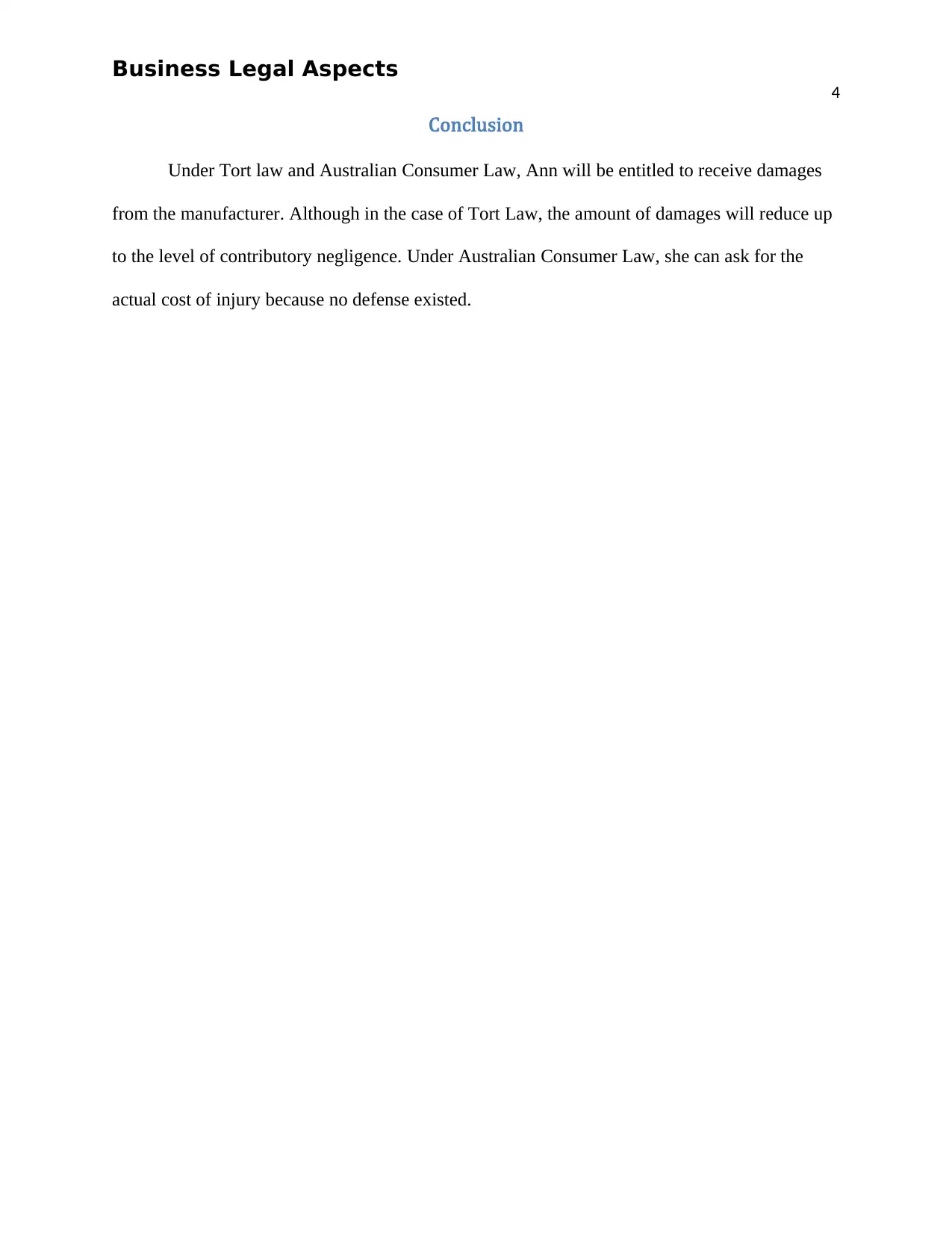
Business Legal Aspects 4
Conclusion
Under Tort law and Australian Consumer Law, Ann will be entitled to receive damages
from the manufacturer. Although in the case of Tort Law, the amount of damages will reduce up
to the level of contributory negligence. Under Australian Consumer Law, she can ask for the
actual cost of injury because no defense existed.
Conclusion
Under Tort law and Australian Consumer Law, Ann will be entitled to receive damages
from the manufacturer. Although in the case of Tort Law, the amount of damages will reduce up
to the level of contributory negligence. Under Australian Consumer Law, she can ask for the
actual cost of injury because no defense existed.
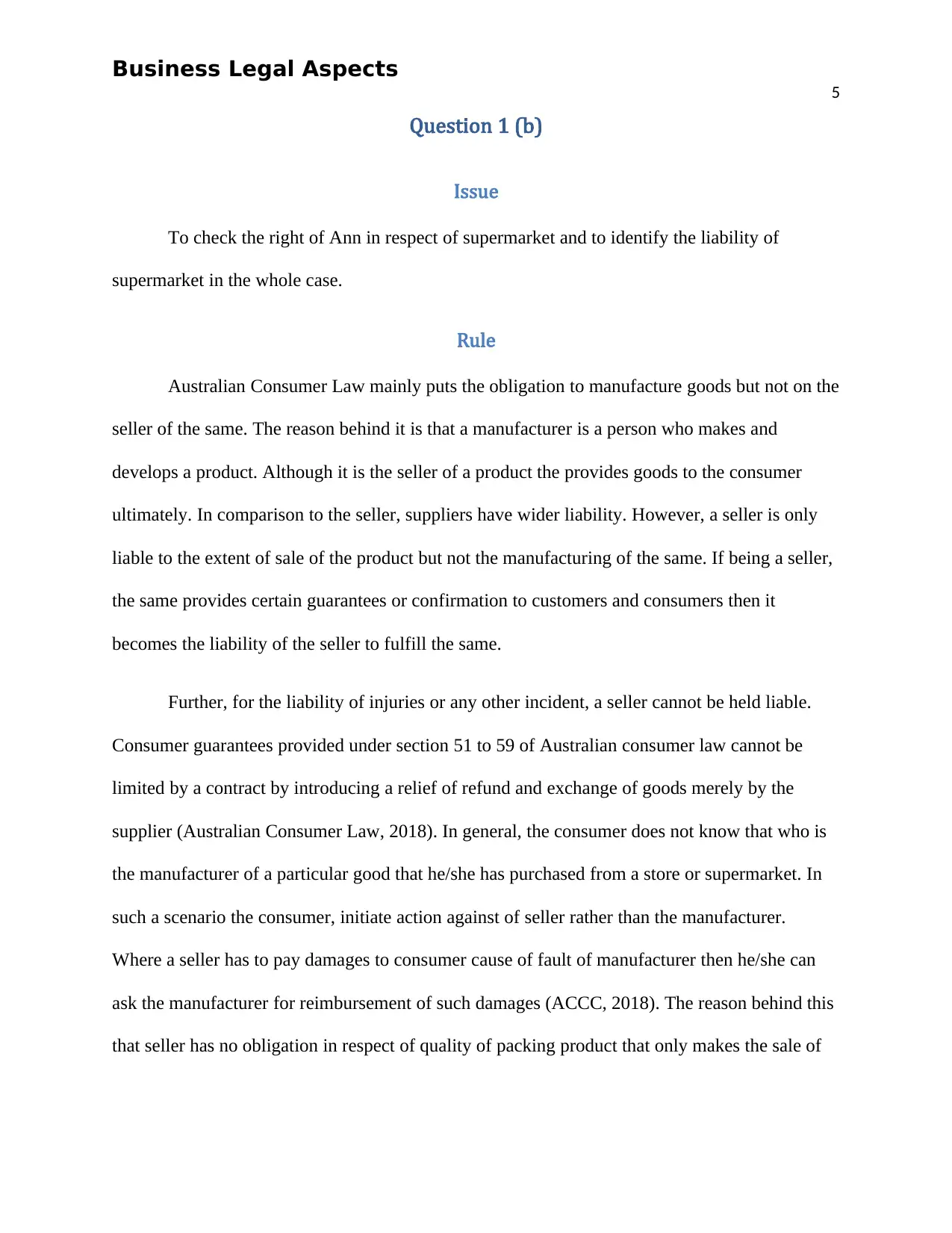
Business Legal Aspects 5
Question 1 (b)
Issue
To check the right of Ann in respect of supermarket and to identify the liability of
supermarket in the whole case.
Rule
Australian Consumer Law mainly puts the obligation to manufacture goods but not on the
seller of the same. The reason behind it is that a manufacturer is a person who makes and
develops a product. Although it is the seller of a product the provides goods to the consumer
ultimately. In comparison to the seller, suppliers have wider liability. However, a seller is only
liable to the extent of sale of the product but not the manufacturing of the same. If being a seller,
the same provides certain guarantees or confirmation to customers and consumers then it
becomes the liability of the seller to fulfill the same.
Further, for the liability of injuries or any other incident, a seller cannot be held liable.
Consumer guarantees provided under section 51 to 59 of Australian consumer law cannot be
limited by a contract by introducing a relief of refund and exchange of goods merely by the
supplier (Australian Consumer Law, 2018). In general, the consumer does not know that who is
the manufacturer of a particular good that he/she has purchased from a store or supermarket. In
such a scenario the consumer, initiate action against of seller rather than the manufacturer.
Where a seller has to pay damages to consumer cause of fault of manufacturer then he/she can
ask the manufacturer for reimbursement of such damages (ACCC, 2018). The reason behind this
that seller has no obligation in respect of quality of packing product that only makes the sale of
Question 1 (b)
Issue
To check the right of Ann in respect of supermarket and to identify the liability of
supermarket in the whole case.
Rule
Australian Consumer Law mainly puts the obligation to manufacture goods but not on the
seller of the same. The reason behind it is that a manufacturer is a person who makes and
develops a product. Although it is the seller of a product the provides goods to the consumer
ultimately. In comparison to the seller, suppliers have wider liability. However, a seller is only
liable to the extent of sale of the product but not the manufacturing of the same. If being a seller,
the same provides certain guarantees or confirmation to customers and consumers then it
becomes the liability of the seller to fulfill the same.
Further, for the liability of injuries or any other incident, a seller cannot be held liable.
Consumer guarantees provided under section 51 to 59 of Australian consumer law cannot be
limited by a contract by introducing a relief of refund and exchange of goods merely by the
supplier (Australian Consumer Law, 2018). In general, the consumer does not know that who is
the manufacturer of a particular good that he/she has purchased from a store or supermarket. In
such a scenario the consumer, initiate action against of seller rather than the manufacturer.
Where a seller has to pay damages to consumer cause of fault of manufacturer then he/she can
ask the manufacturer for reimbursement of such damages (ACCC, 2018). The reason behind this
that seller has no obligation in respect of quality of packing product that only makes the sale of
⊘ This is a preview!⊘
Do you want full access?
Subscribe today to unlock all pages.

Trusted by 1+ million students worldwide

Business Legal Aspects 6
the same. However, it is the responsibility of seller that being a reasonable person the same
should check the expiry date and other aspects of packing goods that can be known by a seller.
Application
In the given case, the issue is related to salami that is packing goods. The manufacturer of
the good has skipped one of the important manufacturing processes. Because of this, bacteria
remained there in the product. One of the consumers of the supermarket, Ann has purchased the
salami, consumed the same and fallen ill. Ann has consumed the product after the expiration of 7
days. As mentioned aforesaid that a seller of good cannot be held liable for the quality of packing
good, Supermarkets Pty. Ltd (Seller) is not a liable party of the case. The seller has acted
reasonably in the case. The expiry date of the product was 31st July and Ann purchased the same
on 20th July. Therefore, it is proven that Supermarket has not placed any expired goods in the
store.
Further, the seller has already mentioned that the same will only be held liable for
replacement of a product in cases of loss or damage by consumption of any product. According
to the provision of the act, a supplier cannot limit the provision and right of a consumer by
stating such clauses, but Supermarkets Pty. Ltd is a seller not the supplier in the case. The same
could display such a clause. Being the seller, the same could do only this because the same could
not take any guarantee in respect of a default in manufacturing. The only manufacturer will be
held liable. If Ann initiates an action against Supermarkets Pty. Ltd and the same has to pay off
damages to her, then the Supermarkets Pty. Ltd can ask the manufacturer to reimbursement of
these expenses.
the same. However, it is the responsibility of seller that being a reasonable person the same
should check the expiry date and other aspects of packing goods that can be known by a seller.
Application
In the given case, the issue is related to salami that is packing goods. The manufacturer of
the good has skipped one of the important manufacturing processes. Because of this, bacteria
remained there in the product. One of the consumers of the supermarket, Ann has purchased the
salami, consumed the same and fallen ill. Ann has consumed the product after the expiration of 7
days. As mentioned aforesaid that a seller of good cannot be held liable for the quality of packing
good, Supermarkets Pty. Ltd (Seller) is not a liable party of the case. The seller has acted
reasonably in the case. The expiry date of the product was 31st July and Ann purchased the same
on 20th July. Therefore, it is proven that Supermarket has not placed any expired goods in the
store.
Further, the seller has already mentioned that the same will only be held liable for
replacement of a product in cases of loss or damage by consumption of any product. According
to the provision of the act, a supplier cannot limit the provision and right of a consumer by
stating such clauses, but Supermarkets Pty. Ltd is a seller not the supplier in the case. The same
could display such a clause. Being the seller, the same could do only this because the same could
not take any guarantee in respect of a default in manufacturing. The only manufacturer will be
held liable. If Ann initiates an action against Supermarkets Pty. Ltd and the same has to pay off
damages to her, then the Supermarkets Pty. Ltd can ask the manufacturer to reimbursement of
these expenses.
Paraphrase This Document
Need a fresh take? Get an instant paraphrase of this document with our AI Paraphraser
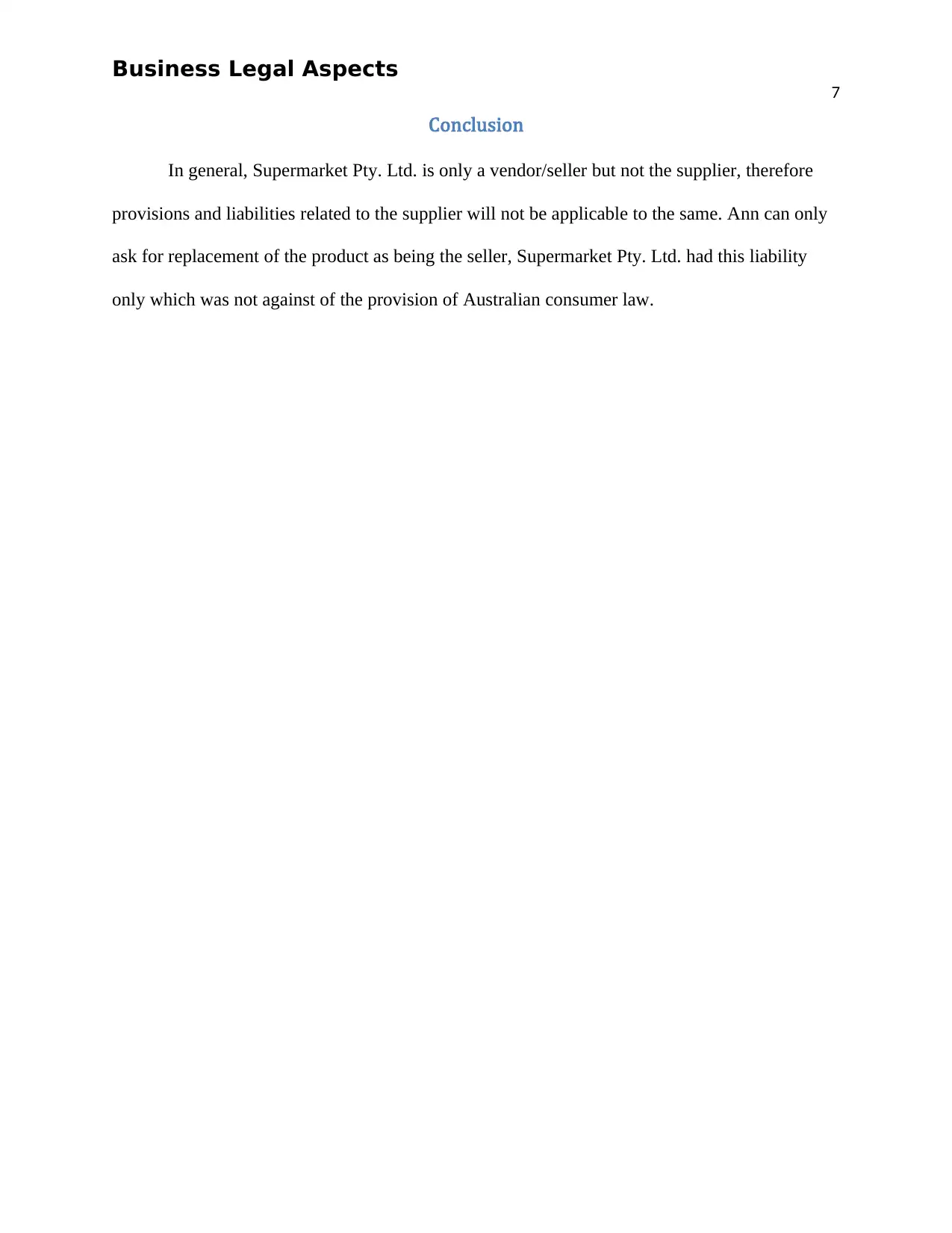
Business Legal Aspects 7
Conclusion
In general, Supermarket Pty. Ltd. is only a vendor/seller but not the supplier, therefore
provisions and liabilities related to the supplier will not be applicable to the same. Ann can only
ask for replacement of the product as being the seller, Supermarket Pty. Ltd. had this liability
only which was not against of the provision of Australian consumer law.
Conclusion
In general, Supermarket Pty. Ltd. is only a vendor/seller but not the supplier, therefore
provisions and liabilities related to the supplier will not be applicable to the same. Ann can only
ask for replacement of the product as being the seller, Supermarket Pty. Ltd. had this liability
only which was not against of the provision of Australian consumer law.
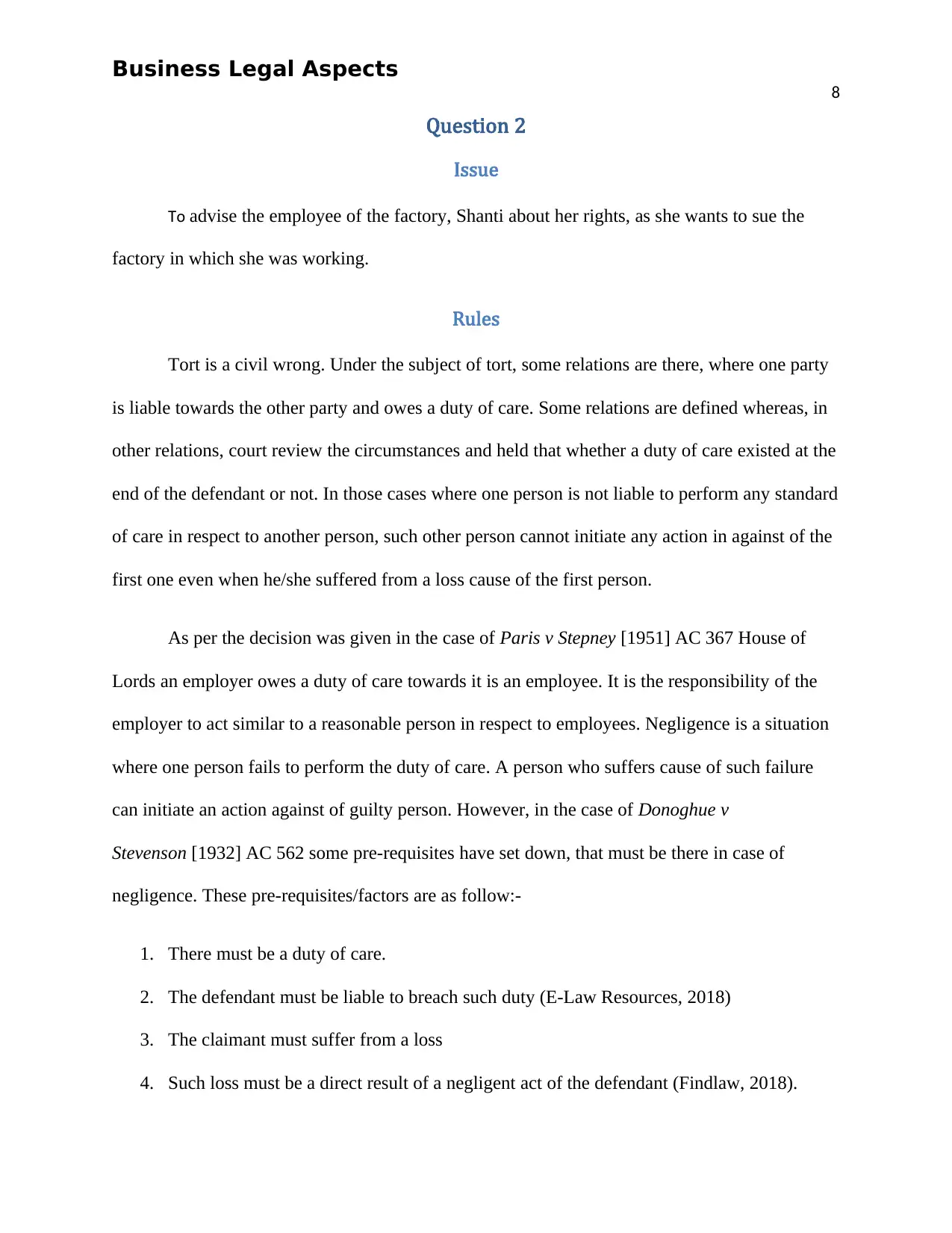
Business Legal Aspects 8
Question 2
Issue
oT advise the employee of the factory, Shanti about her rights, as she wants to sue the
factory in which she was working.
Rules
Tort is a civil wrong. Under the subject of tort, some relations are there, where one party
is liable towards the other party and owes a duty of care. Some relations are defined whereas, in
other relations, court review the circumstances and held that whether a duty of care existed at the
end of the defendant or not. In those cases where one person is not liable to perform any standard
of care in respect to another person, such other person cannot initiate any action in against of the
first one even when he/she suffered from a loss cause of the first person.
As per the decision was given in the case of Paris v Stepney [1951] AC 367 House of
Lords an employer owes a duty of care towards it is an employee. It is the responsibility of the
employer to act similar to a reasonable person in respect to employees. Negligence is a situation
where one person fails to perform the duty of care. A person who suffers cause of such failure
can initiate an action against of guilty person. However, in the case of Donoghue v
Stevenson [1932] AC 562 some pre-requisites have set down, that must be there in case of
negligence. These pre-requisites/factors are as follow:-
1. There must be a duty of care.
2. The defendant must be liable to breach such duty (E-Law Resources, 2018)
3. The claimant must suffer from a loss
4. Such loss must be a direct result of a negligent act of the defendant (Findlaw, 2018).
Question 2
Issue
oT advise the employee of the factory, Shanti about her rights, as she wants to sue the
factory in which she was working.
Rules
Tort is a civil wrong. Under the subject of tort, some relations are there, where one party
is liable towards the other party and owes a duty of care. Some relations are defined whereas, in
other relations, court review the circumstances and held that whether a duty of care existed at the
end of the defendant or not. In those cases where one person is not liable to perform any standard
of care in respect to another person, such other person cannot initiate any action in against of the
first one even when he/she suffered from a loss cause of the first person.
As per the decision was given in the case of Paris v Stepney [1951] AC 367 House of
Lords an employer owes a duty of care towards it is an employee. It is the responsibility of the
employer to act similar to a reasonable person in respect to employees. Negligence is a situation
where one person fails to perform the duty of care. A person who suffers cause of such failure
can initiate an action against of guilty person. However, in the case of Donoghue v
Stevenson [1932] AC 562 some pre-requisites have set down, that must be there in case of
negligence. These pre-requisites/factors are as follow:-
1. There must be a duty of care.
2. The defendant must be liable to breach such duty (E-Law Resources, 2018)
3. The claimant must suffer from a loss
4. Such loss must be a direct result of a negligent act of the defendant (Findlaw, 2018).
⊘ This is a preview!⊘
Do you want full access?
Subscribe today to unlock all pages.

Trusted by 1+ million students worldwide
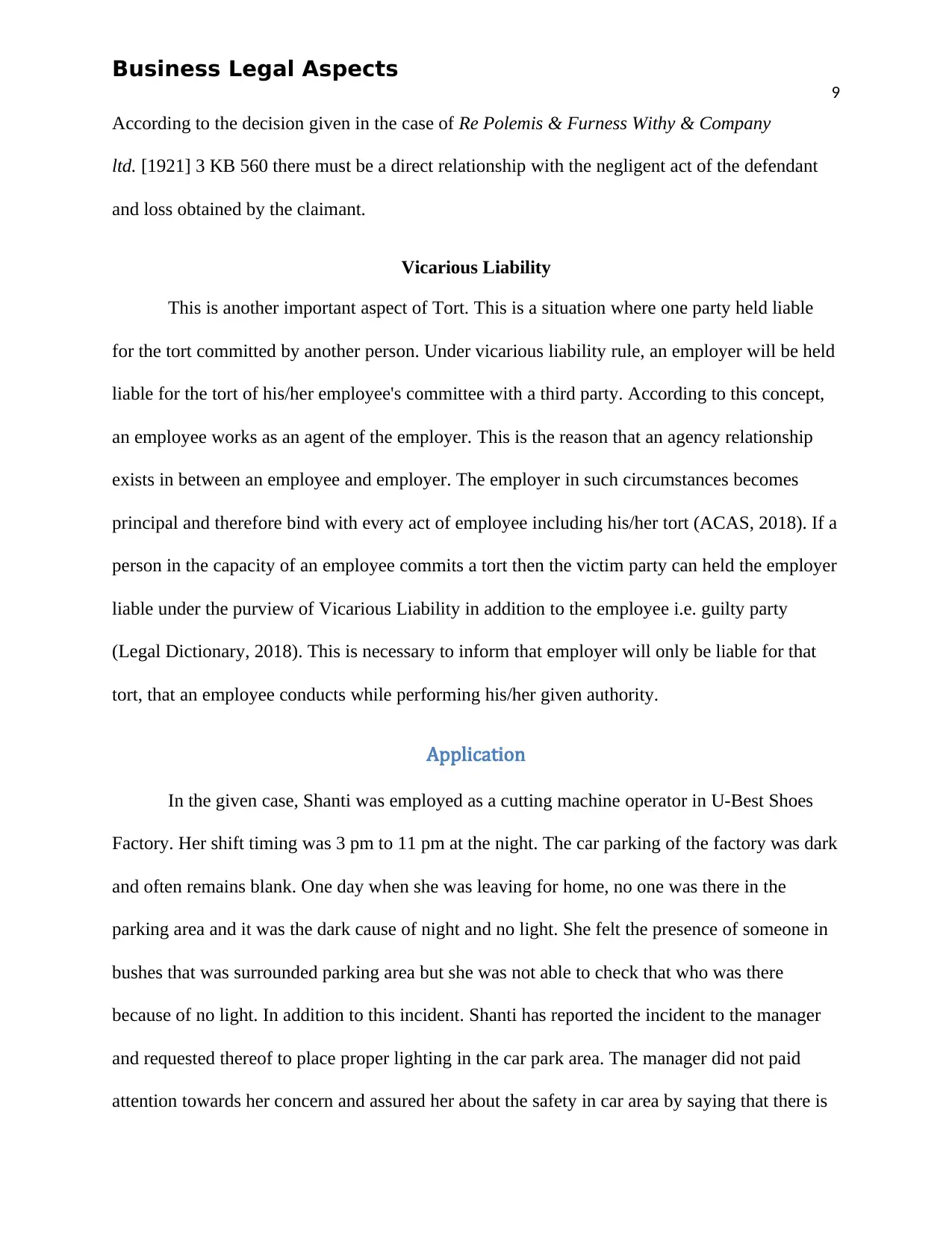
Business Legal Aspects 9
According to the decision given in the case of Re Polemis & Furness Withy & Company
ltd. [1921] 3 KB 560 there must be a direct relationship with the negligent act of the defendant
and loss obtained by the claimant.
Vicarious Liability
This is another important aspect of Tort. This is a situation where one party held liable
for the tort committed by another person. Under vicarious liability rule, an employer will be held
liable for the tort of his/her employee's committee with a third party. According to this concept,
an employee works as an agent of the employer. This is the reason that an agency relationship
exists in between an employee and employer. The employer in such circumstances becomes
principal and therefore bind with every act of employee including his/her tort (ACAS, 2018). If a
person in the capacity of an employee commits a tort then the victim party can held the employer
liable under the purview of Vicarious Liability in addition to the employee i.e. guilty party
(Legal Dictionary, 2018). This is necessary to inform that employer will only be liable for that
tort, that an employee conducts while performing his/her given authority.
Application
In the given case, Shanti was employed as a cutting machine operator in U-Best Shoes
Factory. Her shift timing was 3 pm to 11 pm at the night. The car parking of the factory was dark
and often remains blank. One day when she was leaving for home, no one was there in the
parking area and it was the dark cause of night and no light. She felt the presence of someone in
bushes that was surrounded parking area but she was not able to check that who was there
because of no light. In addition to this incident. Shanti has reported the incident to the manager
and requested thereof to place proper lighting in the car park area. The manager did not paid
attention towards her concern and assured her about the safety in car area by saying that there is
According to the decision given in the case of Re Polemis & Furness Withy & Company
ltd. [1921] 3 KB 560 there must be a direct relationship with the negligent act of the defendant
and loss obtained by the claimant.
Vicarious Liability
This is another important aspect of Tort. This is a situation where one party held liable
for the tort committed by another person. Under vicarious liability rule, an employer will be held
liable for the tort of his/her employee's committee with a third party. According to this concept,
an employee works as an agent of the employer. This is the reason that an agency relationship
exists in between an employee and employer. The employer in such circumstances becomes
principal and therefore bind with every act of employee including his/her tort (ACAS, 2018). If a
person in the capacity of an employee commits a tort then the victim party can held the employer
liable under the purview of Vicarious Liability in addition to the employee i.e. guilty party
(Legal Dictionary, 2018). This is necessary to inform that employer will only be liable for that
tort, that an employee conducts while performing his/her given authority.
Application
In the given case, Shanti was employed as a cutting machine operator in U-Best Shoes
Factory. Her shift timing was 3 pm to 11 pm at the night. The car parking of the factory was dark
and often remains blank. One day when she was leaving for home, no one was there in the
parking area and it was the dark cause of night and no light. She felt the presence of someone in
bushes that was surrounded parking area but she was not able to check that who was there
because of no light. In addition to this incident. Shanti has reported the incident to the manager
and requested thereof to place proper lighting in the car park area. The manager did not paid
attention towards her concern and assured her about the safety in car area by saying that there is
Paraphrase This Document
Need a fresh take? Get an instant paraphrase of this document with our AI Paraphraser
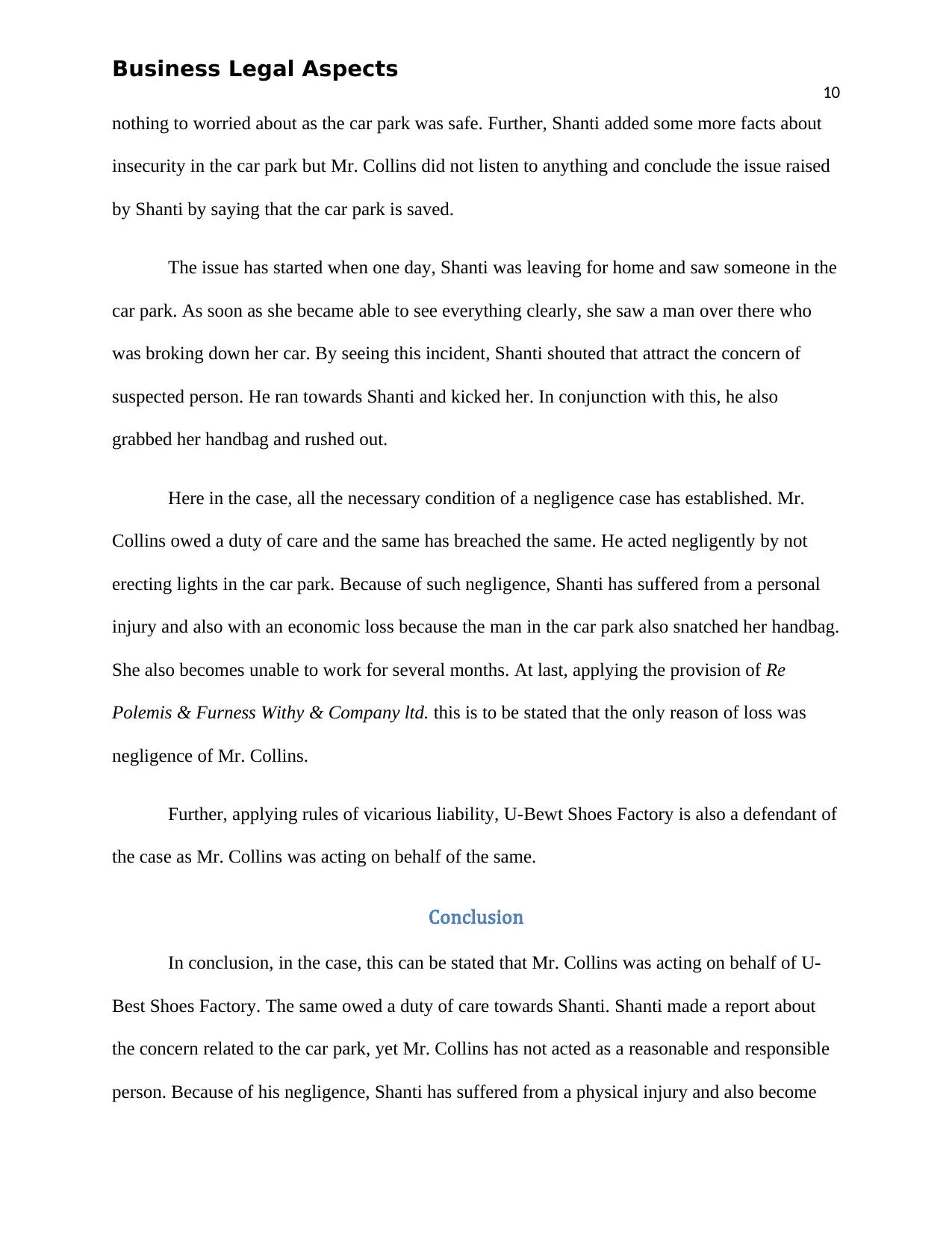
Business Legal Aspects 10
nothing to worried about as the car park was safe. Further, Shanti added some more facts about
insecurity in the car park but Mr. Collins did not listen to anything and conclude the issue raised
by Shanti by saying that the car park is saved.
The issue has started when one day, Shanti was leaving for home and saw someone in the
car park. As soon as she became able to see everything clearly, she saw a man over there who
was broking down her car. By seeing this incident, Shanti shouted that attract the concern of
suspected person. He ran towards Shanti and kicked her. In conjunction with this, he also
grabbed her handbag and rushed out.
Here in the case, all the necessary condition of a negligence case has established. Mr.
Collins owed a duty of care and the same has breached the same. He acted negligently by not
erecting lights in the car park. Because of such negligence, Shanti has suffered from a personal
injury and also with an economic loss because the man in the car park also snatched her handbag.
She also becomes unable to work for several months. At last, applying the provision of Re
Polemis & Furness Withy & Company ltd. this is to be stated that the only reason of loss was
negligence of Mr. Collins.
Further, applying rules of vicarious liability, U-Bewt Shoes Factory is also a defendant of
the case as Mr. Collins was acting on behalf of the same.
Conclusion
In conclusion, in the case, this can be stated that Mr. Collins was acting on behalf of U-
Best Shoes Factory. The same owed a duty of care towards Shanti. Shanti made a report about
the concern related to the car park, yet Mr. Collins has not acted as a reasonable and responsible
person. Because of his negligence, Shanti has suffered from a physical injury and also become
nothing to worried about as the car park was safe. Further, Shanti added some more facts about
insecurity in the car park but Mr. Collins did not listen to anything and conclude the issue raised
by Shanti by saying that the car park is saved.
The issue has started when one day, Shanti was leaving for home and saw someone in the
car park. As soon as she became able to see everything clearly, she saw a man over there who
was broking down her car. By seeing this incident, Shanti shouted that attract the concern of
suspected person. He ran towards Shanti and kicked her. In conjunction with this, he also
grabbed her handbag and rushed out.
Here in the case, all the necessary condition of a negligence case has established. Mr.
Collins owed a duty of care and the same has breached the same. He acted negligently by not
erecting lights in the car park. Because of such negligence, Shanti has suffered from a personal
injury and also with an economic loss because the man in the car park also snatched her handbag.
She also becomes unable to work for several months. At last, applying the provision of Re
Polemis & Furness Withy & Company ltd. this is to be stated that the only reason of loss was
negligence of Mr. Collins.
Further, applying rules of vicarious liability, U-Bewt Shoes Factory is also a defendant of
the case as Mr. Collins was acting on behalf of the same.
Conclusion
In conclusion, in the case, this can be stated that Mr. Collins was acting on behalf of U-
Best Shoes Factory. The same owed a duty of care towards Shanti. Shanti made a report about
the concern related to the car park, yet Mr. Collins has not acted as a reasonable and responsible
person. Because of his negligence, Shanti has suffered from a physical injury and also become
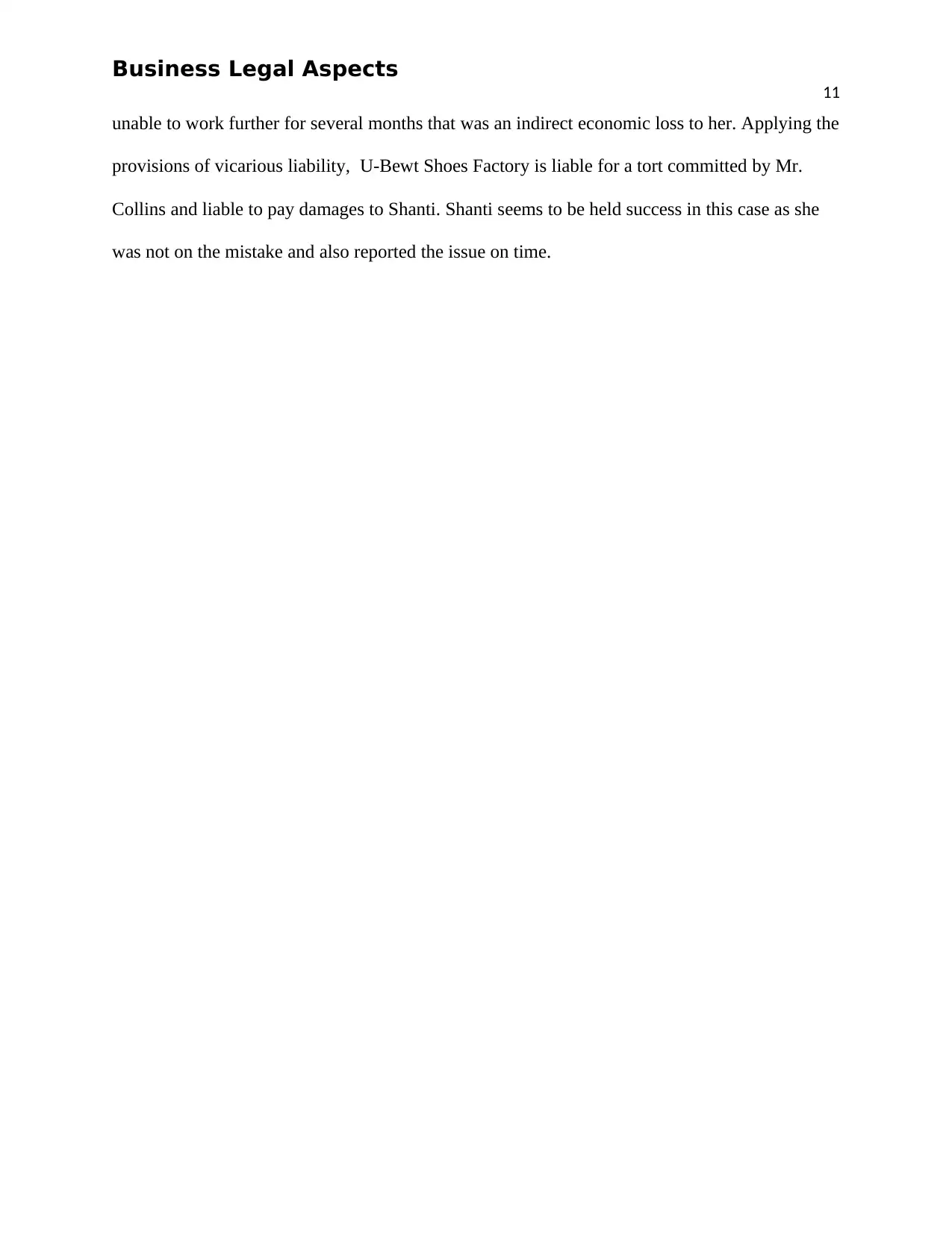
Business Legal Aspects 11
unable to work further for several months that was an indirect economic loss to her. Applying the
provisions of vicarious liability, U-Bewt Shoes Factory is liable for a tort committed by Mr.
Collins and liable to pay damages to Shanti. Shanti seems to be held success in this case as she
was not on the mistake and also reported the issue on time.
unable to work further for several months that was an indirect economic loss to her. Applying the
provisions of vicarious liability, U-Bewt Shoes Factory is liable for a tort committed by Mr.
Collins and liable to pay damages to Shanti. Shanti seems to be held success in this case as she
was not on the mistake and also reported the issue on time.
⊘ This is a preview!⊘
Do you want full access?
Subscribe today to unlock all pages.

Trusted by 1+ million students worldwide
1 out of 14
Related Documents
Your All-in-One AI-Powered Toolkit for Academic Success.
+13062052269
info@desklib.com
Available 24*7 on WhatsApp / Email
![[object Object]](/_next/static/media/star-bottom.7253800d.svg)
Unlock your academic potential
Copyright © 2020–2026 A2Z Services. All Rights Reserved. Developed and managed by ZUCOL.




